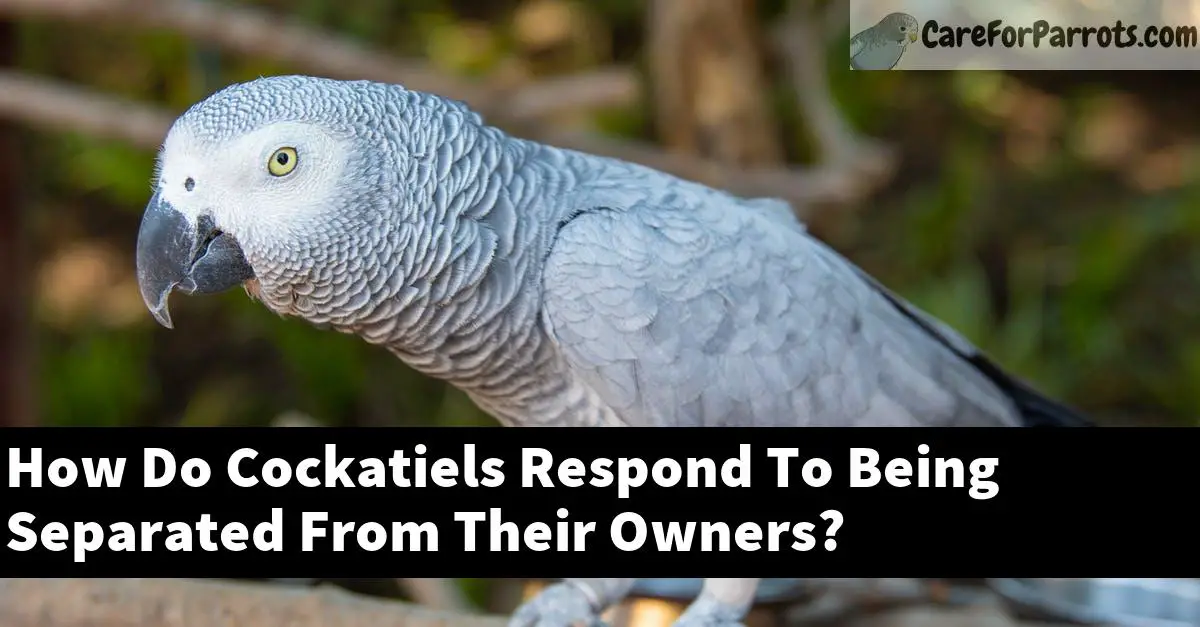Cockatiels are very social birds and will generally become agitated and distressed when they are separated from their owners. Many cockatiels will try to search for their owners or will refuse to eat or drink if they are left alone.
Table of Contents
How do cockatiels react when they are first separated from their owner?
When a cockatiel is first separated from their owner, they may exhibit a range of behaviors including: being clingy and wanting to be close to the owner; being scared and withdrawn; or being aggressive and trying to fight or escape. It is important to remember that cockatiels are animals and willreact in a way that is familiar to them.
Some cockatiels may take a little while to adjust to their new surroundings and may need some reassurance from their owner. It is also important to keep in mind that cockatiels may become more independent once they have gotten used to their new surroundings.
How do cockatiels respond to being away from their owner for extended periods of time?
There are a few potential responses cockatiels may exhibit when away from their owner for extended periods of time. Many owners report that their cockatiels become restless, destructive, and/or vocal.
Many cockatiels also appear to become depressed or withdraw from social interaction. Some cockatiels may also develop an interest in exploring their surroundings or in new activities.
It is important to note that cockatiels are social animals and will likely become stressed if they are not provided with regular opportunities to interact with their owner. It is also important to keep in mind that cockatiels are animals and may react in different ways than humans would when away from home.
It is always best to consult with a veterinarian if a cockatiel becomes stressed or appears to be exhibiting signs of distress.
What are some of the common behavioral changes cockatiels exhibit when they are separated from their owner?
When a cockatiel is separated from its owner, it may become anxious and restless. It may try to escape or cling to anyone who comes near.
It may refuse to eat or drink, or it may become destructive. Cockatiels may also become irritable and aggressive with other birds.
How does the absence of their owner affect a cockatiel’s behavior?
The absence of an owner can have a significant impact on a cockatiel’s behavior. In the wild, cockatiels live in tightly-knit social groups, and are very dependent upon their companions for survival.
When an owner is absent, the cockatiel may become restless and aggressive, as it searches for a replacement. Without an owner to provide guidance and discipline, the bird may become unmanageable and even destructive.
Are there any long-term effects of being separated from their owner on a cockatiel’s behavior?
There is no definitive answer to this question as it is difficult to study the effects of long-term separation on cockatiel behavior. However, there are some potential long-term effects that could occur if a cockatiel is separated from its owner.
One potential long-term effect of being separated from its owner is that the cockatiel may become agitated and stressed. This is likely due to the fact that the cockatiel may feel lost and confused without its owner.
Additionally, cockatiels are social animals and may experience a lack of social interaction if they are separated from their owner. This could lead to the cockatiel becoming reclusive and withdrawn from the rest of the bird community.
Another potential long-term effect of being separated from its owner is that the cockatiel may develop a fear of humans. This is likely due to the fact that humans are the cockatiel’s primary source of care and attention.
If the cockatiel becomes fearful of humans, it may have difficulty interacting with them or seeking their company. This could have a negative impact on the cockatiel’s overall welfare.
Overall, it is difficult to determine the long-term effects of being separated from its owner on a cockatiel’s behavior. However, it is important to be aware of these potential effects and take measures to ensure that the cockatiel is safe and secure.
What can owners do to help ease their cockatiel’s transition when they are away from them?
When an owner is away from their cockatiel, they can do a few things to make their bird feel more comfortable and relaxed. One thing owners can do is to provide plenty of toys and perches for the cockatiel to play with.
This will help keep the bird entertained and distracted from being sad or lonely. Additionally, owners can make sure to put fresh food and water in the bird’s food and water dishes when they are away, as this will help the bird to feel well-nourished and hydrated.
Finally, owners can talk to their cockatiel frequently when they are away, telling the bird how much they love them and how much they miss them. This will help to keep the bird reassured and happy while they are away.
What should owners be aware of when leaving their cockatiel alone for extended periods of time?
When leaving a cockatiel alone for extended periods of time, owners should be aware of the following:
• Cockatiels are social animals and will naturally want to be around people and other birds. If left alone, a cockatiel may become bored and destructive, chewing on objects or engaging in other abnormal behaviors.
• Cockatiels require regular exercise to be healthy. If left alone, a cockatiel may become inactive and develop health problems, such as obesity or feather plucking.
• Cockatiels should be given food and water if left alone, and should be monitored for any changes in behavior or health.
Summary
cockatiels are very social birds and will generally become agitated and distressed when they are separated from their owners. Many cockatiels will try to search for their owners or will refuse to eat or drink if they are left alone.






